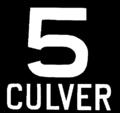Culver Shuttle
This article needs additional citations for verification. (October 2016) |
 Culver Shuttle | |
 Remaining trackway of the Culver Shuttle at Ditmas Avenue station | |
| Northern end | Ninth Avenue |
|---|---|
| Southern end | Ditmas Avenue |
| Stations | 4 |
| Started service | October 30, 1954 |
| Discontinued | May 10, 1975 |
The Culver Shuttle was a New York City Subway shuttle, running along a remnant of the BMT Culver Line, most of which is now the IND Culver Line. The shuttle was originally the Brooklyn-Manhattan Transit Corporation (BMT)'s 5 service, providing through service on the Culver Line between Coney Island and Manhattan. The F train is the current successor to Culver Line service. The line had 1,000 riders during its final month of service in 1975.[1]
History

The number 5 was assigned in 1924. At the time, all BMT Culver Line trains used the elevated BMT Fifth Avenue Line, running over the Brooklyn Bridge to Park Row. Rush-hour trains made no stops between 36th Street and Atlantic Avenue (both directions in morning rush hour, southbound only in afternoon rush hour).
Subway trains started to run on the Culver Line on May 30, 1931, when the Nassau Street Loop was completed. These trains used the south half of the Nassau Loop, ending at Chambers Street. These subway trains ran on the underground BMT Fourth Avenue Line, running on a now-demolished segment of the Culver Line between Ninth Avenue on the BMT West End Line and Ditmas Avenue. During rush hours and Saturday mornings, they used the full loop, entering Manhattan via the Manhattan Bridge and leaving via the Montague Street Tunnel. These trains only ran to Kings Highway on the Brooklyn end. Rush hour trains ran express on the BMT Fourth Avenue Line; trains operating in the reverse-peak direction ran express between Ninth Avenue and Kings Highway. Elevated service was cut back to Ninth Avenue, except during rush hours, when it was extended to Coney Island (and continued to run express on the Fifth Avenue Line, though both directions during both rush hours).
The BMT Fifth Avenue Line was closed on May 31, 1940, and from that time all Culver trains used the Fourth Avenue Line subway.
Saturday morning rush hour Culver-Nassau Street Express and Culver Shuttles were discontinued on June 24, 1950.[2]
On October 30, 1954, a connection opened between the BMT Culver Line and the Independent Subway System (IND's) South Brooklyn Line at Ditmas Avenue. BMT Culver Line trains were truncated to Ditmas Avenue, while the D train, a formerly-IND service, now ran on the Culver Line between Coney Island and Ditmas Avenue, continuing to Manhattan.[3] Since 1967, service on the Culver Line to Manhattan has been provided by the F train.[4][5][6] After 1954, some Culver Line trains continued to run to Chambers Street in Manhattan until May 28, 1959, when they were all truncated to a shuttle between Ninth Avenue and Ditmas Avenue. The change facilitated increased service on the other services on the Fourth Avenue Line.[7]
This Culver Shuttle, assigned the label SS in 1960, last ran on May 10, 1975.[8] The elevated trestle between Ninth Avenue and Ditmas Avenue, along with the 13th Avenue and Fort Hamilton Parkway stations stood abandoned until finally being demolished in the mid-1980s. The only remnants of the Culver Shuttle are the lower platforms and tracks at Ninth Avenue and a section of the trestle attached to the Coney Island-bound platform at Ditmas Avenue. The right of way has been sold, as houses have been built on the old right of way near the Ditmas Avenue station.
As a replacement, the transit authority offered free transfers to the parallel B35 bus route.[9]
References
- ^ "Culver Shuttle Construction". Culver Shuttle. Retrieved 28 September 2019.
- ^ "Changes in BMT service". New York Division Bulletin. 8 (8). Electric Railroaders' Association. August 1965.
- ^ "Bronx to Coney Ride In New Subway Link" (PDF). New York Times. October 18, 1954. Retrieved February 20, 2016.
- ^ Perlmutter, Emanuel (November 16, 1967). "SUBWAY CHANGES TO SPEED SERVICE: Major Alterations in Maps, Routes and Signs Will Take Effect Nov. 26" (PDF). The New York Times. Retrieved July 7, 2015.
- ^ Raskin, Joseph B. (2013). The Routes Not Taken: A Trip Through New York City's Unbuilt Subway System. New York, New York: Fordham University Press. doi:10.5422/fordham/9780823253692.001.0001. ISBN 978-0-82325-369-2.
- ^ "Subway Route Changes Put in Effect; Capacity Increased". The New York Times. November 26, 1967. ISSN 0362-4331. Retrieved July 26, 2017.
- ^ "Annual Report For The Year Ended June 30, 1959". Smithsonian library. New York City Transit Authority. Retrieved 22 September 2019.
- ^ Kelly, John (May 9, 1975). "End of Line for Culver Shuttle". New York Daily News. p. KL7. Retrieved October 16, 2019 – via Brooklyn Public Library; newspapers.com
 .
.
- ^ Fowler, Glenn (April 27, 1975). "For Culver Shuttle It's the 11th Hour". The New York Times. Retrieved September 5, 2016.
External links
| External videos | |
|---|---|
